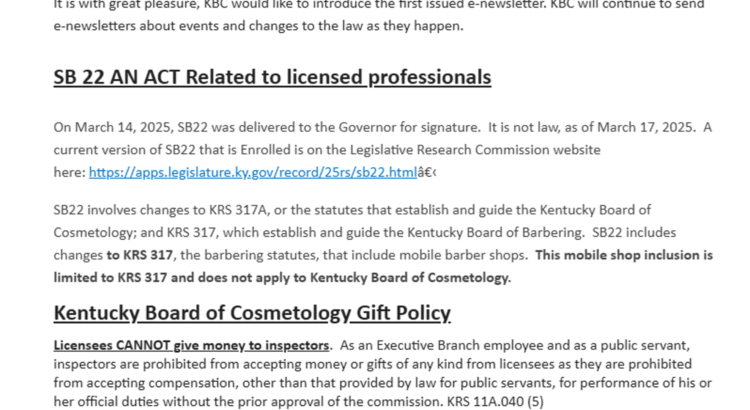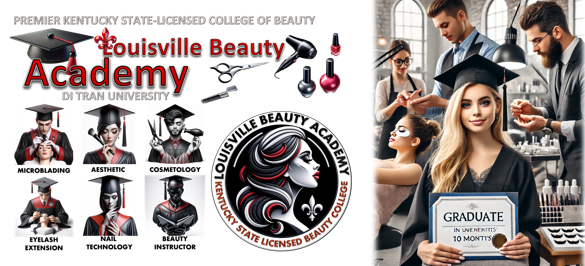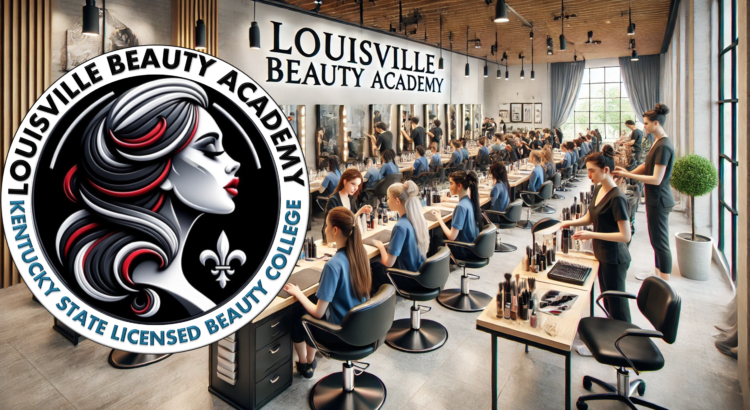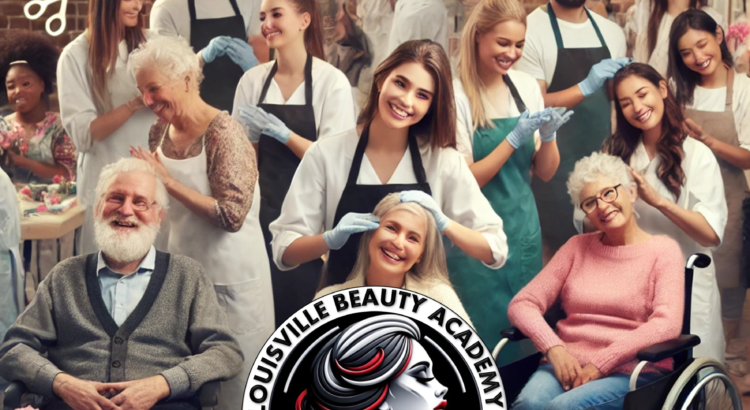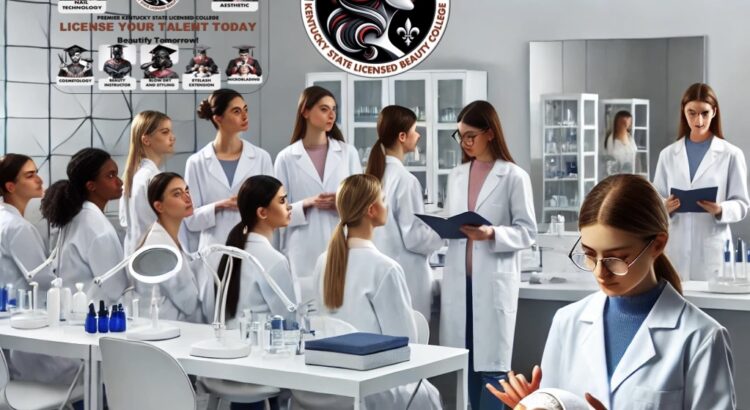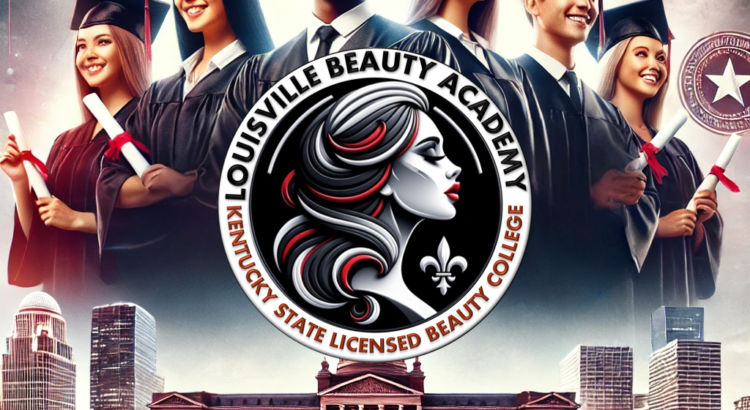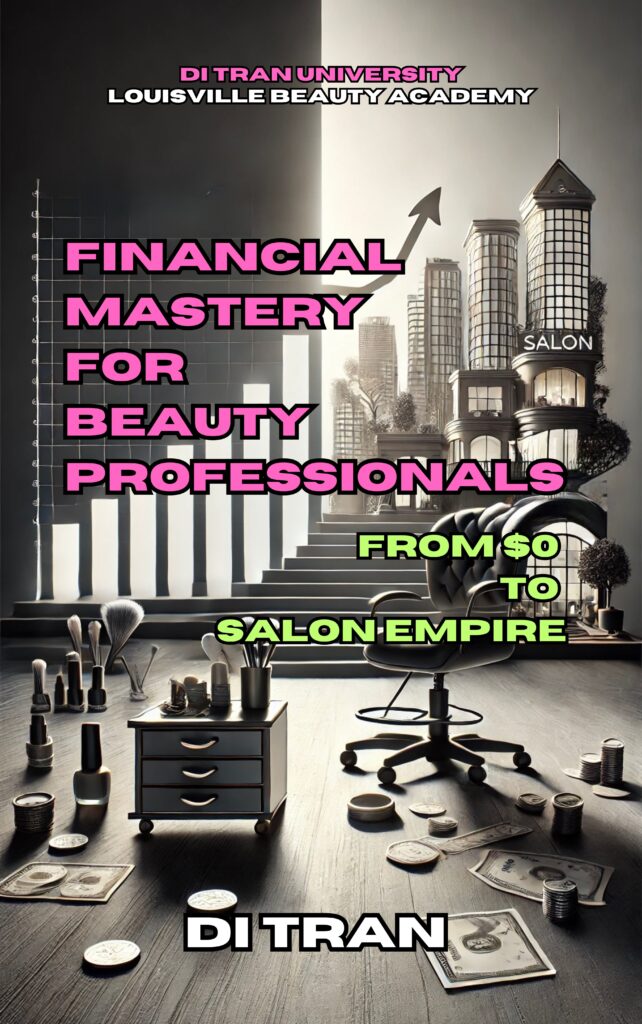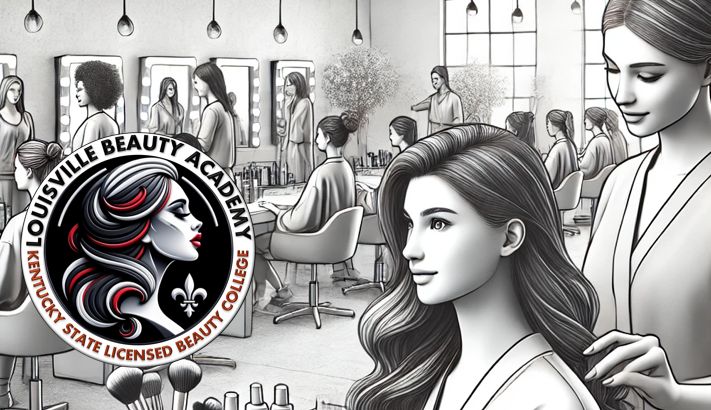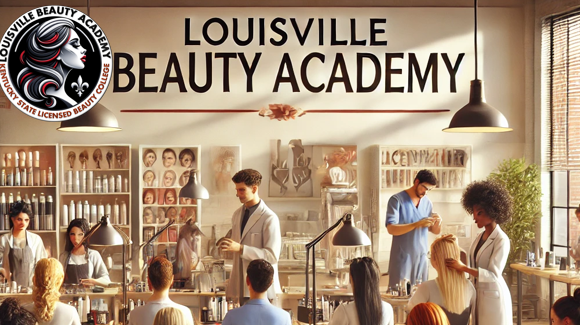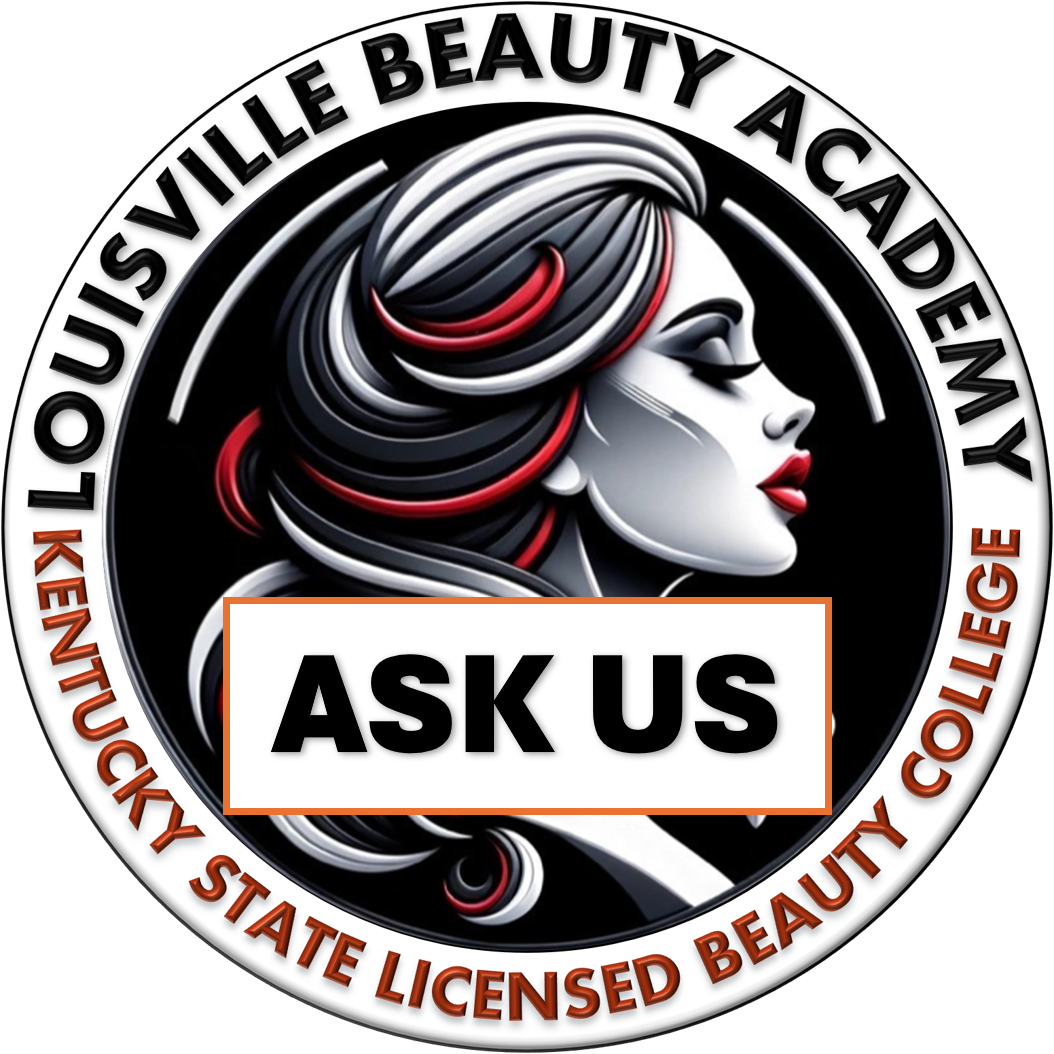March 21, 2025, marks a historic moment for the Kentucky State Board of Cosmetology (KBC) as it releases its first-ever mass e-newsletter, signifying a new commitment to providing timely updates on industry regulations, legislative changes, and policies affecting licensed beauty professionals, students, and the public. Louisville Beauty Academy (LBA), a state-licensed and state-accredited beauty college in Kentucky, proudly recognizes and supports this advancement as part of its commitment to delivering regulatory knowledge to the beauty community.
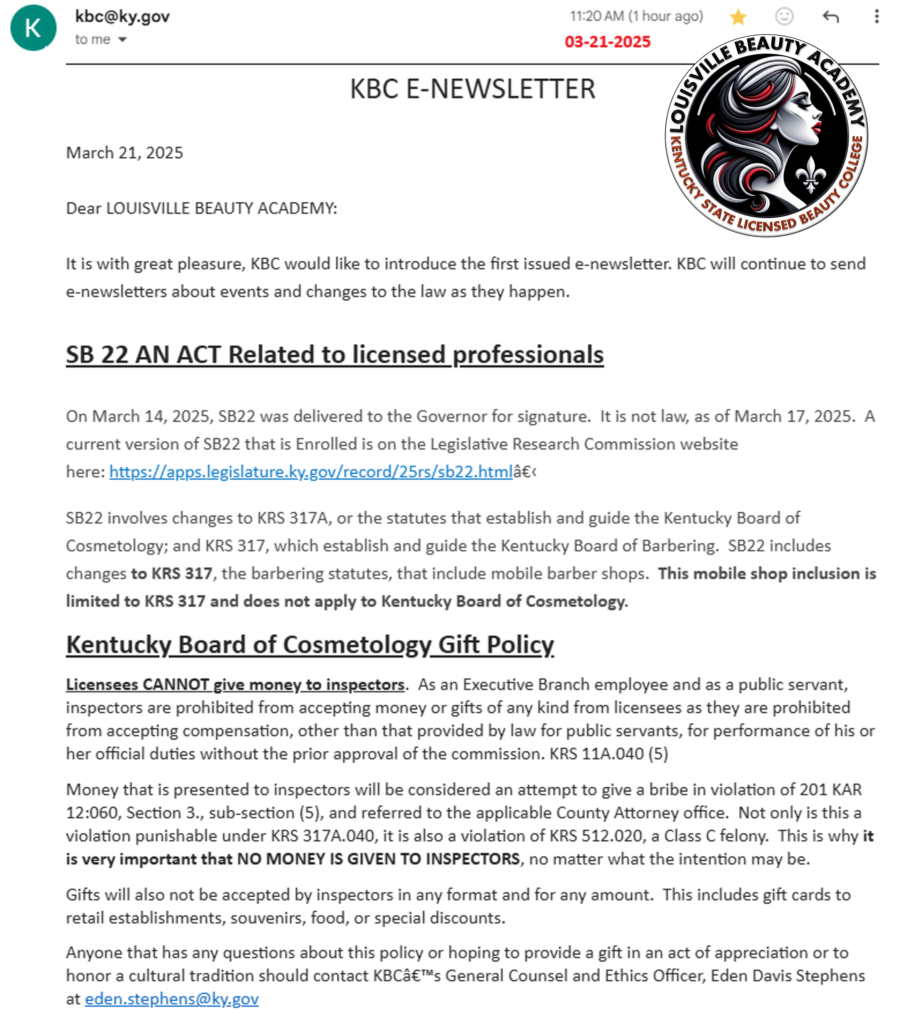
Senate Bill 22 (SB22) – Updates on Licensed Professionals and Mobile Barber Shops
One of the primary highlights in the first KBC newsletter is Senate Bill 22 (SB22), which was delivered to the Governor for signature on March 14, 2025. While not yet enacted as of March 17, 2025, the bill’s current enrolled version can be reviewed on the Legislative Research Commission’s website: https://apps.legislature.ky.gov/record/25rs/sb22.html.
SB22 includes changes related to KRS 317A, which governs the Kentucky Board of Cosmetology, and KRS 317, which oversees the Kentucky Board of Barbering. Importantly, the bill includes updates specific to mobile barber shops under KRS 317. However, these mobile shop provisions do not apply to the Kentucky Board of Cosmetology or cosmetology establishments.
Kentucky Board of Cosmetology Gift Policy – Strict Prohibitions on Monetary Gifts to Inspectors
Another significant topic covered in the newsletter is a firm reminder regarding the Kentucky Board of Cosmetology’s policy prohibiting licensees from giving money or gifts to inspectors.
According to KBC, as Executive Branch employees and public servants, inspectors are strictly prohibited from accepting money or gifts of any kind from licensees. This regulation is in place to maintain integrity and uphold ethical standards within the industry. Inspectors can only accept compensation that is officially authorized for their role, per KRS 11A.040 (5).
- Attempting to offer money or gifts to an inspector is considered an attempt to bribe a public official and is a violation of 201 KAR 12:060, Section 3, subsection (5).
- Violating this policy can result in severe consequences, including referral to the County Attorney’s Office for further legal action.
- Criminal penalties may apply, including violations under KRS 317A.040 and KRS 512.020, a Class C Felony.
No form of gift is acceptable—regardless of the intention or monetary value. This includes:
✔️ Gift cards to retail establishments
✔️ Souvenirs
✔️ Food or beverages
✔️ Special discounts or incentives
Licensees or individuals seeking clarification on this policy or those wishing to honor a cultural tradition related to gift-giving should contact KBC General Counsel and Ethics Officer Eden Davis Stephens at eden.stephens@ky.gov.
Louisville Beauty Academy’s Commitment to Spreading Regulatory Awareness
Louisville Beauty Academy (LBA), as a state-licensed and state-accredited beauty college in Kentucky, is dedicated to ensuring that all students, graduates, and beauty professionals remain informed of regulatory updates. By monitoring and promptly sharing changes from the Kentucky State Board of Cosmetology, LBA helps beauty professionals stay compliant, protect their licenses, and advance their careers with full awareness of industry laws.
Key initiatives at Louisville Beauty Academy include:
- Curriculum Updates: Incorporating regulatory changes directly into coursework to prepare students for real-world compliance.
- Workshops & Compliance Training: Providing ongoing education to students, alumni, and beauty professionals on industry standards and legal obligations.
- Access to Information: LBA ensures that any updates, including state law changes, KBC regulations, and policy shifts, are disseminated to the beauty community in a timely manner.
Legal Considerations and Next Steps for Licensees and Beauty Professionals
In light of these recent updates, all licensed professionals should take the following proactive steps to ensure compliance with Kentucky cosmetology laws:
✔ Review Senate Bill 22 (SB22) and its impact on mobile barber shops. While it does not directly affect cosmetology, it is essential to understand the legislative environment.
✔ Adhere to the KBC Gift Policy and never offer gifts or monetary compensation to inspectors. Any violations can result in severe legal consequences.
✔ Stay updated with KBC’s newsletters and official announcements. These publications will now serve as a primary source of regulatory news for Kentucky’s beauty professionals.
✔ Attend Board meetings and actively engage with industry updates. KBC provides dates and schedules for upcoming meetings where stakeholders can stay informed and voice concerns.
✔ Ensure that your beauty school or employer follows all state regulations. Schools like Louisville Beauty Academy are instrumental in delivering up-to-date compliance education.
Disclaimer
Louisville Beauty Academy provides this information as a public service and educational resource. While we strive to ensure accuracy, individuals are advised to consult the Kentucky State Board of Cosmetology or legal professionals for the most current and personalized guidance regarding state laws and regulations.
A Historic Step Toward a More Informed Beauty Community
The Kentucky State Board of Cosmetology’s launch of its first-ever mass newsletter is a groundbreaking shift toward greater industry transparency and accessibility. Louisville Beauty Academy proudly supports and shares this initiative, ensuring that Kentucky’s beauty professionals—students, graduates, and salon owners—stay informed, protected, and empowered with knowledge.
With this new mode of communication, the beauty industry in Kentucky can expect greater clarity, proactive guidance, and enhanced regulatory awareness moving forward.
